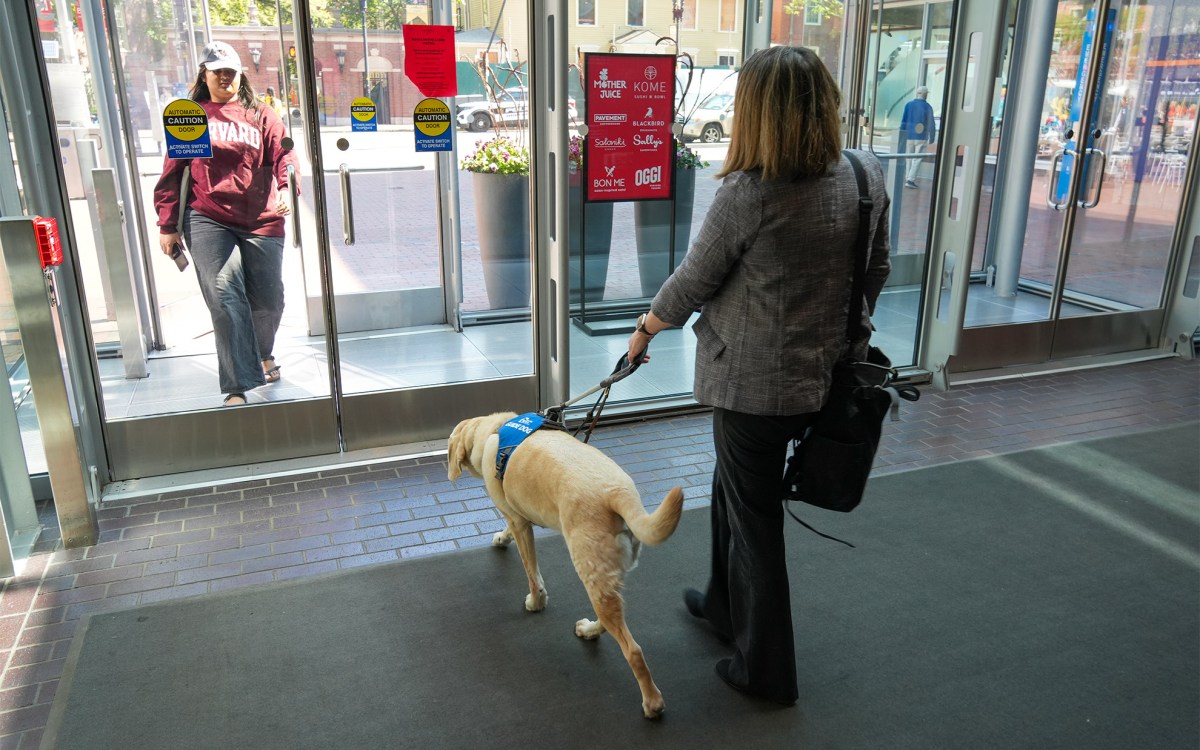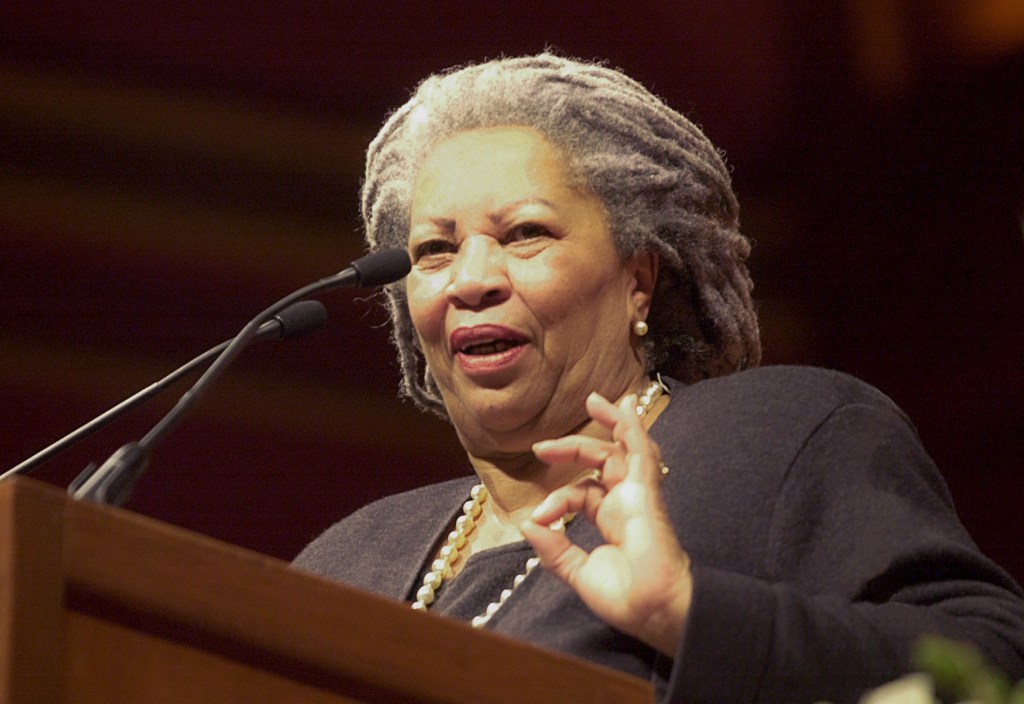Campus & Community
-

What’s the greatest love song of all time?
Faculty and administrators tell you theirs
-

Of different faiths, but connected by belief
Community members gather to explore identity, spiritual experience at first ‘Across This Table’ interfaith dinner
-

Batman returns — to accept his Pudding Pot
Michael Keaton feted as Hasty Pudding’s Man of the Year, 30 years after first invite
-

Funding innovative approaches to belonging
Supported by grants from the Culture Lab, four projects aim to strengthen belonging through listening, discussion, art, and representation
-

Class of 2001 elects Alejandra Casillas as chief marshal of alumni
Physician and health equity leader to serve in time-honored role
-

A second shot at Olympic glory
Battle-tested current, former students return to Winter Games
-
In Brief
Volunteer opportunities in Boston schools
-
Mounting evidence indicts passive smoking
The exposure of bar and restaurant staff to tobacco smoke from patrons can be as high as the exposure of active smokers, according to a study in the March 9 issue of the New Zealand Medical Journal. Wael Al-Delaimy, the studys principal author, is currently a research fellow at the Harvard School of Public Health in the Department of Nutrition.
-
Reynolds Price to give Peabody Lecture
The 2001 Francis Greenwood Peabody Lecture will be given by Reynolds Price, James B. Duke Professor of English at Duke University, at 10:30 a.m. on Saturday, April 21, in the Memorial Church. The lecture is free and open to the public.
-
Service to be held for Lord Runcie
A memorial service for the Right Reverend and Right Honorable Lord Robert Runcie of Cuddesdon will be held at 4 p.m. on Saturday, April 21, in the Memorial Church. The service is open to the public. It will be the only such service offered in the United States in memory of the late archbishop. Lord Runcie served as the 102nd archbishop of Canterbury from 1980 to 1991, and during his tenure expressed reformist ideas that were often in opposition to the then Conservative government.
-
Leg up on the competition
There are some areas where, believe it or not, Harvard is not No. 1.
-
Harvard joins Ivy League partners in community service days
When it comes to the Ivy League, the competitive atmosphere among the best and the brightest – from the intellectual to the athletic – can be thick at times. Rarely does an opportunity arise in which Ivy League students can cooperate toward a common goal. Yet this spring, more than 3,500 Ivy students will do their part in breathing new life into that old air.
-
Charting familial territory
You wouldnt think someone could get in trouble for saying that people in the past loved their children or that husbands and wives, at least in some cases, cared about and respected one another.
-
Talking diction with Dame Diana
Some Harvard educators were the ones doing the listening last week when actress Dame Diana Rigg staged a brief demonstration on the proper use of theatrical vocal techniques.
-
‘When We Liked Ike’
No other recent decade seems quite as dated as the 1950s. The 60s comes close with its bell-bottoms and tie-dyed T-shirts, psychedelic posters, and ubiquitous peace signs. But many of us still recognize the 60s as the convulsive birth pang or our own self-indulgent, anything-goes era. The decade of the 1950s, however, is a world apart.
-
Africa AIDS assault will depend on U.S. leadership
The future of the massive, international anti-AIDS effort outlined by 128 Harvard faculty last week lies squarely in the hands of the Bush administration, which has given the plan a warm reception but which has yet to pledge any funds, according to Center for International Development Director Jeffrey Sachs.
-
It’s another record breaker
Letters of acceptance to the Class of 2005 have been mailed to 2,041 applicants from a record pool of 19,009. For the 10th time in the past 11 years, applications for admission to Harvard have risen. Last year, 18,693 students applied for the 1,650 places in the entering class. The percentage of admitted students was the lowest in Harvards history (10.7 percent). Women will comprise nearly 49 percent of the class, an unprecedented proportion.
-
Rudenstine to chair new digital arts venture
Beginning to plan his post-presidential pursuits, President Neil L. Rudenstine has agreed to serve as chairman of a major new nonprofit organization that will develop, maintain, and distribute digital resources for the study of art, architecture, design, and related fields in the humanities.
-
Faculty Council notice for April 4
At its 12th meeting of the year, the Council met with Dean Bruce Donoff (Dental Medicine) and Professor Bjorn Olsen (Oral Biology) to discuss a proposed joint FAS/Dental School Ph.D. in Biological Sciences in Dental Medicine. Deans Peter Ellison (Graduate School) and Margot Gill (Administrative Dean), and Professor David Pilbeam (Associate Dean of the Faculty) were present for this conversation.
-
Harvard Choir and Mozart Society to perform ‘Creation’
The Harvard University Choir and the Mozart Society Orchestra join together in a performance of The Creation, composed by Franz Joseph Haydn, under the direction of conductor Robert Lehmann. The concert features soloists Jean Danton as Gabriel, Mark Risinger as Raphael, and Thomas Gregg as Uriel. The performance takes place at 8 p.m. on Sunday, April 8, in Sanders Theatre. Tickets are available at the door or through the Harvard Box Office at (617) 496-2222.
-
This month in Harvard history
April 25, 1674 The Harvard Corporation orders that “freshmen of the Colledg shall not at any time be compelled by any Senior students to goe on errands or doe…
-
Police reports
Following are some of the incidents reported to the Harvard University Police Department for the week ending March 31. The official log is located at Police Headquarters, 29 Garden St.
-
The economics of ‘creative destruction’
As an idealistic young student in Paris, Philippe Aghion dreamed of making the world a better place, of reducing inequality and environmental damage, and of taking better advantage of technological progress to reduce poverty and illiteracy and increase social well-being.
-
The Big Picture: Wolfgang Rueckner
When he was 17 years old, Wolfgang Rueckner did not build a go-cart for the science fair. He decided to build an ion rocket engine instead – the ones that can propel a rocket in the vacuum of space. So, he wrote NASA and they sent him some research papers, and young Wolfgang obtained a huge sewer pipe from the city, sealed it with boilerplates, and somebody gave me a very crude pump, so I pumped it out. Then he boiled mercury in a flask to vaporize it and bombarded it with electrons until it got ionized, and voila! The experiment worked, and it looked memorable, too – that glowing trail of blue ionized mercury vapor processing eerily through the sewer pipe.
-
NewsMakers
Botterill named 2001 Patty Kazmaier Memorial Award winner Crimson women’s hockey forward, Jennifer Botterill, has been selected as this year’s Patty Kazmaier Memorial Award recipient. Presented by Texaco, the award…
-
Scientists ponder sequence of genes
Eric Lander was riding in a taxi during the week in February when government and private scientists published a nearly complete sequence of human genes. Not knowing that Lander, of the Whitehead Institute in Cambridge, played a major role in that effort, the driver explained that the first map of all our genes – the blueprint of life – was now a reality. Lander remembers thinking, then, why am I going back to work?
-
UHS gains best accreditation score ever
University Health Services (UHS) has achieved its highest accreditation score ever from the Joint Commission on Accreditation of Heathcare Organizations, earning 99 points out of 100 after a rigorous three-day inspection.
-
$50M endowment from Ford
Making government work better, both at home and abroad, is the goal behind a $50 million endowment grant awarded today by the Ford Foundation to the Kennedy School of Government (KSG). It is the largest single donation KSG has ever received and the largest single endowment ever made by the Ford Foundation.
-
Grogan moving to Boston Foundation
Vice President for Government, Community and Public Affairs Paul Grogan will leave Harvard July 1 to take the helm of The Boston Foundation, a philanthropy dedicated to building community in Boston and helping the citys poor.
-
Ryan named director of Workforce Initiatives
Associate Vice President for Human Resources Polly Price has announced the appointment of Henry Ryan as director of Workforce Initiatives for Harvard University. Ryan joined the University on Monday, April 2.
-
Daffodil sales blossom by 2.2 percent
Harvard collected a record $34,101 for the American Cancer Societys annual Daffodil Days fundraiser this year, topping last years total by 2.2 percent and helping fund the Cancer Society programs, including research seeking a cure for the disease. This years results come just months after the University was recognized in February for being the top single-site seller in New England. This is the fourth consecutive year the University set an all-time high for contributions during Daffodil Days.
-
Radcliffe Public Policy Center gets National Science Foundation Grant
How are women faring in the information technology (IT) industry? Researchers from the Radcliffe Public Policy Center (RPPC) will address that question during a three-year study – funded by the National Science Foundation (NSF) – of women working in IT. RPPC will partner with the Massachusetts Software and Internet Council (MSIC) to study employees in its member firms, using cutting-edge Internet-based survey technology in addition to field interviews. The project will establish the nations first systematic research database concerning workers in the IT industry.
-
Joint Center Housing Studies fellowships and opportunities
The Joint Center for Housing Studies is offering a fellowship award for the 2001-02 academic year for doctoral candidates who are engaged in writing a dissertation on a housing-related topic consistent with the centers research agenda. The award will provide a stipend of $10,000. The Meyer Dissertation Fellowship is named in honor of John R. Meyer, professor of capital formation and economic growth emeritus, of the Kennedy School of Government.
-
Harvard calls on former Secretary of Treasury
Robert E. Rubin will be the principal speaker at the Afternoon Exercises of Harvards 350th Commencement on Thursday, June 7.
-
Morrison talks race and gender
Relationships between black and white women in literature have provided a sometimes painful mirror of racial stereotypes in the real world, Nobel Prize-winning author Toni Morrison said Tuesday, concluding, however, that literature today has gotten beyond stereotypes, no longer mirroring reality but running ahead of it.

-
John E. Dowling receives Gund Award
John E. Dowling, the Maria Moors Cabot Professor of Natural Sciences at Harvard University, was recently awarded the prestigious Llura Liggett Gund Award from The Foundation Fighting Blindness.


